Health - Your Legacy
 If you knew about breakthrough advances in health available to you for free would you use them? Demand them?
If you knew about breakthrough advances in health available to you for free would you use them? Demand them?
It is literally impossible to overstate the challenge we confront when it comes to our health and the substances we consume. The forces at war against our good health are in every way the enormous powers of our culture, our institutions and the very structure of our society.
We are talking here about trillions of dollars in commerce — the food and agriculture industries, healthcare and nutrition industries, the global advertising and public relations giants, our political system, to name only the most obvious — and, the most ferocious Titan of them all, the most addictive substance on earth… sugar. These are the powers we face.
Unless we work together to deal with our sugar addiction challenge and the inevitable, catastrophic results of too much sugar consumption – the eight chronic metabolic syndrome (insulin resistance) diseases: heart disease, lipid (blood) problems, hypertension, type 2 diabetes, cancer (especially breast and colon), polycystic ovarian syndrome, and dementia – we will be responsible for passing on a horrendously flawed and fatal legacy to our grandkids.
In his recent book, The Hacking of the American Mind, Dr. Robert H. Lustig, M.D., MSL Professor of Pediatrics in the Division of Endocrinology at the University of California, San Francisco, clearly explains the science behind the outright manipulation of our insatiable need for pleasure and how that is driving our epidemic of addiction, depression, and chronic disease. (1.)
So what will our legacy be? On our watch will we look the other way and continue to allow certain “powers of our society” to destroy our health and more importantly (as a child of the Baby Boomer generation) the health of our children and grandchildren? Or, will we rise to the challenge and make Health a priority?
Dr. Robert H. Lustig, M.D., MSL Professor of Pediatrics in the Division of Endocrinology at the University of California, San Francisco, one of the world’s most vocal anti-sugar advocates, characterizes the enormity of our challenge: “the obesity epidemic itself is in large part a direct result of “sugar addiction” similar to alcohol and cocaine brought about by the ubiquitous use of fructose (sugar) in nearly 100% of processed foods sold to the public. (2.)
“No one chooses obesity. Obesity chooses them... How long do you believe you can exert a cognitive inhibition (willpower) control over a biochemical drive that goes on 24/7/365, getting worse every single day that you don’t perform it? No one can exert that level of willpower over a biochemical. It’s just not possible.” (3.)
Nearly all of us in the U.S. unknowingly consume mega-amounts of High Fructose Corn Syrup (HFCS). And, after years of consumption we are in serious trouble physically and our nation is near the healthcare breaking point financially.
High Fructose Corn Syrup, and its cousin sucrose, are both slow poisons. Consumption of mega-amounts of sugar is now proven to link directly with at least eight of the most common diseases which affect 60% of U.S. population and total 75% of global healthcare expenditures. (3.)
“Further, Dr. Lustig, et al., clearly described our challenge in the conclusion of Toward Evidence-Based Polices for Reduction of Dietary Sugars, Lessons from the Alcohol Experience (4.):
“Any successful regulatory approach to preventing the health harms associated with the overconsumption of dietary sugars must not just confront, but ideally balance, the complex and competing interests of consumers, government, and commercial interests, including producers, distributors, and retailers. The production and sale of alcohol, as with sugar, is an important economic activity that generates profits, jobs, tax dollars, and currency. Industrial producers and distributors face economic losses when consumption is reduced, thus placing public health goals at loggerhead with commercial interests. Meanwhile, government has its own competing interests. On the one hand, it is charged with protecting the economy, encouraging commodity exports, increasing its own tax base, and generating tariffs. On the other hand, governments are responsible for protecting public health, as well as financing the costs of chronic disease through pubic insurance programs like Medicare and subsidizing the costs of food through federal assistance programs for low-income populations. While these interests are not necessarily irreconcilable, understanding and balancing these personal–commercial–governmental alignments is essential for promoting effective regulatory regimes.”
“The political and economic barriers inherent in applying lessons learned from the alcohol experience to dietary sugar are significant, but not insurmountable. One barrier to policy change is the food industry itself. Virtually all food companies are now part of vast, publicly traded conglomerates that have a fiduciary responsibility to shareholders and are judged on 3-month profit cycles.”
Taken in the light of the gargantuan health challenge we face, the City of Philadelphia's adoption of a "sweetened beverage tax" is obviously only a single step toward slaying enormous giants to ensure the health of ourselves, our children and our grandchildren.
Still, it is a step which we must make in every city throughout the world in order to mount our successful challenge to overcome the powers of our society.
Sources
1. 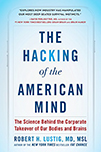 The Hacking of the American Mind, The Science Behind the Corporate Takeover of our Bodies and Brains, Dr. Robert H. Lustig, M.D., MSL Professor of Pediatrics in the Division of Endocrinology at the University of California, San Francisco.
The Hacking of the American Mind, The Science Behind the Corporate Takeover of our Bodies and Brains, Dr. Robert H. Lustig, M.D., MSL Professor of Pediatrics in the Division of Endocrinology at the University of California, San Francisco.
2. “Sugar the Bitter Truth”, Dr. Robert H. Lustig, M.D., MSL Professor of Pediatrics in the Division of Endocrinology at the University of California, San Francisco, UCTV Series: UCSF Mini Medical School for the Public [7/2009] [Health and Medicine] [Show ID: 16717]
3. "The Skinny on Obesity”, 7-part series. Go here to see (Ep. 4): Sugar - A Sweet Addiction, Dr. Robert H. Lustig, M.D.
4. Toward Evidence-Based Policies for Reduction of Dietary Sugars, Lessons from the Alcohol Experience, Laura A. Schmidt, Anisha I. Patel, Claire D. Brindis, and Robert H. Lustig, M.D.
More Valuable Information
1. 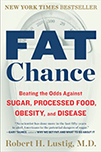 Check Dr. Lustig's New York Times best seller, Fat Chance: Beating the Odds Against Sugar, Processed Food, Obesity, and Disease. Go here for more information.
Check Dr. Lustig's New York Times best seller, Fat Chance: Beating the Odds Against Sugar, Processed Food, Obesity, and Disease. Go here for more information.
2. Go here to watch the feature film FED UP trailer and for more information.
3. Watch Sugar Coated on Netflix and see the trailer plus more information here.
4. 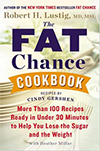 The Fat Chance Cookbook, presents more than 100 recipes as well as meal plans, nutritional analyses, shopping lists, and food swaps, to help you drastically reduce sugar and increase fiber to lose weight and regain health. Dr. Lustig also explains how to navigate the grocery store and how to read a food label in order to ferret out hidden sugars and evaluate fiber content. Go here for more information.
The Fat Chance Cookbook, presents more than 100 recipes as well as meal plans, nutritional analyses, shopping lists, and food swaps, to help you drastically reduce sugar and increase fiber to lose weight and regain health. Dr. Lustig also explains how to navigate the grocery store and how to read a food label in order to ferret out hidden sugars and evaluate fiber content. Go here for more information.
Life Changing Discoveries
The one thing I have learned in this life is that what we discover today will turn a bright, revealing light on what we thought we knew for certain.
Consider water. Because water is everywhere, we believe we know a lot about it. After all, water is water, right? We know potable water is better to drink because it is clear of unhealthy contaminates and not to drink bad water. That’s about it.
But, there is much more to learn about water.
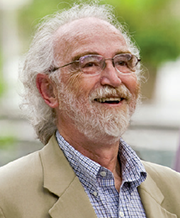 Dr. Gerald Pollack, professor of Bioengineering, University of Washington (Seattle), explains, “More than 99% of molecules in our body are water, but we don’t have a clue about how water works. We really don’t understand it,” he said.
Dr. Gerald Pollack, professor of Bioengineering, University of Washington (Seattle), explains, “More than 99% of molecules in our body are water, but we don’t have a clue about how water works. We really don’t understand it,” he said.
After years of research, Dr. Pollack and his associates have discovered that water is not just a solid (ice), a liquid or a vapor. There is a fourth phase of water… EZ water or structured water.
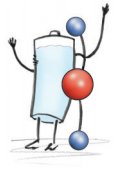 Dubbed Exclusion Zone (EZ) water for the characteristic “exclusion zone” which the water exhibits when proximate to hydrophilic surfaces such as within a cell, EZ water differs from common water (H2O) due to its third hydrogen atom (H3O2) and unique, liquid crystalline, honeycomb-like structure.
Dubbed Exclusion Zone (EZ) water for the characteristic “exclusion zone” which the water exhibits when proximate to hydrophilic surfaces such as within a cell, EZ water differs from common water (H2O) due to its third hydrogen atom (H3O2) and unique, liquid crystalline, honeycomb-like structure.
From a health perspective, Dr. Pollack’s discoveries center around the fundamental, life-sustaining role which EZ water plays on a cellular level within the human body. His discoveries have lead to a clearer understanding of the mechanics of illness and healthiness. Among them are:
- Our cells are full of EZ water.
- When cells are sick they have less EZ water.
- Drinking EZ water rehydrates cells quickly and reverses pathologies.
- EZ water plays a critical role in making joints work without friction.
Light hitting water converts it into EZ water. Any wave length - infrared, ultraviolet, visible - will do the trick, but most especially infrared. Pressure, like the pressure exerted by the earth on deep spring water can convert water into EZ water. Dr. Pollack has found that EZ water is denser than normal water and speculates that the pressure exerted by the earth converts normal water into EZ water. Another way to build up EZ water in your cells is to spend some time in a sauna or in the sun. And finally, “earthing” (grounding) or connecting to the earth by walking barefooted on the beach or elsewhere helps your cells build up EZ water.
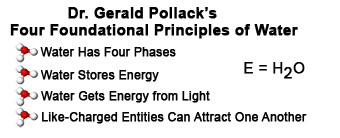 “Water is getting energy from the environment all the time taking it in all the time, not just sitting there in equilibrium,” explains Dr. Pollack. “Water is an engine of sorts, transducing energy (light – infrared, ultraviolet, near ultraviolet, visible - from a multitude of sources) into other kinds of energy.” Water acts as a transducer by converting electro mechanical energy into mechanical energy of flow in at least one way similar to photosynthesis. That is why drinking EZ water is drinking potential energy.
“Water is getting energy from the environment all the time taking it in all the time, not just sitting there in equilibrium,” explains Dr. Pollack. “Water is an engine of sorts, transducing energy (light – infrared, ultraviolet, near ultraviolet, visible - from a multitude of sources) into other kinds of energy.” Water acts as a transducer by converting electro mechanical energy into mechanical energy of flow in at least one way similar to photosynthesis. That is why drinking EZ water is drinking potential energy.
But most of us don't drink it. And, that is a mistake we are all making.
Drinking EZ water could be the most important health decision we can make in our lives and the lives of those we love.
So where can we find this EZ water?
Fortunately it appears to be found in deep water springs and in glacier run off. The problem, of course, is making sure we are indeed drinking EZ water. But there are tests for that and we will be learning more about them and EZ water in the days ahead.
You can locate a spring close to you by accessing Find a Spring. Find a Spring is a community and user created database of natural springs around the world. When you go to the site, see "Locate A Spring" at the upper left in the website masthead. Please note: the spring water you find may or may not be EZ water.
More Information
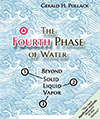 Video about the EZ water health connection
Video about the EZ water health connection
“The Fourth Phase of Water: Central Role in Biology”
About EZ water: the University of Washington faculty lecture award
“Water, Energy, and Life: Fresh Views From the Water's Edge”
Websites
Pollack Laboratory
The University of Washington Department of Bioengineering
Dr. Pollack’s recent book
"The Fourth Phase of Water: Beyond Solid, Liquid, and Vapor"
Reducing Your Risk for Dementia Through Diet
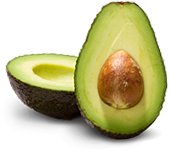 Do you, a loved one or a friend exhibit signs of Alzheimer? Please view the video below... “Natural health expert and Mercola.com founder Dr. Joseph Mercola interviews Dr. David Perlmutter about the implications of diet to Alzheimer's risk.”
Do you, a loved one or a friend exhibit signs of Alzheimer? Please view the video below... “Natural health expert and Mercola.com founder Dr. Joseph Mercola interviews Dr. David Perlmutter about the implications of diet to Alzheimer's risk.”
Go here for more about reducing risk of Alzheimer.Also, please go here for this article: “Completely New Models of Dementia Care Are Emerging Across the Globe”.